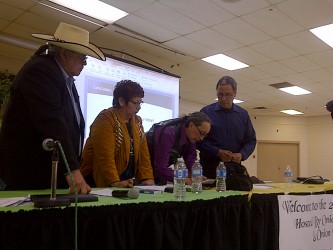Article Origin
Volume
Issue
Year
An innovative approach to economic development promises to generate self-sufficiency for four partner First Nations.
Last month, a memorandum of understanding was signed between Onion Lake Energy, owned and operated by Onion Lake Cree Nation which straddles the Alberta-Saskatchewan border, and Driftpile, Sucker Creek, and Ermineskin First Nations. The agreement to create the Wanska Energy Alliance will see the four First Nations work together as strategic partners over the next year to explore economic opportunities, including joint gas and oil ventures.
Onion Lake Cree, which is the largest oil-producing First Nation in Canada, and Ermineskin First Nation, which also operates its own energy company, bring expertise and already formed partnerships to the alliance, said Sucker Creek Chief Jim Badger. He said talks to form this alliance began three to four years ago and a relationship of trust was built over that time.
Badger said there are 17 wells drilled on Sucker Creek but most are held in abeyance by oil and gas companies. Oil and gas development potential is huge for Sucker Creek, which shares the Swan Hill area as traditional territory with Driftpile First Nation, he added, but neither First Nation has been able to do any resource work in that area.
“Here in Sucker Creek, the reason we can’t play, meaning working the system, is we don’t have the necessary capacity or capital to be able to do as we wish,” said Badger. “With the alliance, there’s considerable resources being brought, especially by the two First Nations, Onion Lake and Ermineskin.”
Another advantage, said Rose Laboucan, Chief of Driftpile First Nation, is the ability to be able to bring First Nation knowledge and experience in the oil and gas field to the negotiation table. At this point, there is no oil and gas work being undertaken on her First Nation, but Laboucan said she is in the process of meeting with an oil company to discuss development.
“I would be bringing (Onion Lake’s) experts to my meeting, because I don’t have that knowledge or insight into how it works sitting at my table. They have access to a lot because they’ve gone and grown so much…. They would know what questions to ask. They can actually be the ones to come and drill here,” said Laboucan.
Badger said he was impressed when he spoke to Canadian Natural Resources Ltd., Fogo Energy Corp., and Black Pearl Resources, oil and gas companies already drilling on Onion Lake Cree Nation.
“It was obvious to me … that they were so proud in terms of working with First Nations. I’ve never seen that before. It was very encouraging,” he said.
Badger said taking the federal government out of the oil and gas industry on the First Nations provides more opportunities for membership and more opportunities to develop further faster.
“There will be limited (federal) government involvement once we set up our own structures….If there’s no resources or capital coming from them, they don’t set the rules,” he said. “The end goal is self-sufficiency. Because we’re not self-sufficient, our hands are tied. We’re pretty much dictated to as well as legislated by the Indian Act, how to do things and everything like that, and basically it’s a continuance of the residential school format.”
The partnership between the four First Nations is expected to bring economic development beyond the oil and gas industry.
“The potential is there for investment from First Nations in other areas,” said Ermineskin Chief Craig Mackinaw.
Laboucan said she sees the agreement “as an overall collaboration between the Nations who want to move and advance their agenda on economic development” which could include capital support from the partner Nations for a five-star RV site along Lesser Slave Lake which Driftpile is developing. She said Driftpile will be making presentations to Onion Lake and Ermineskin for financial support of the development.
“Investment by them in whatever process we use, will be very valuable for the community,” said Laboucan.
And it’s jobs for membership, which means further economic development on the reserve.
“The workforce that’s developed will be able to recycle the dollars within our communities. That’s what’s missing right now. (The money is) recycled outside our communities,” said Laboucan.
Laboucan said she is excited about the potential of the agreement.
“It’s not been done before so we’re kind of setting the stage for something new among First Nations,” she said. “I hope it works and we’re all working well together and collaborating on what could be the future for our communities.”
- 3749 views

